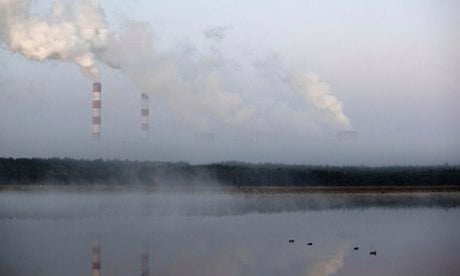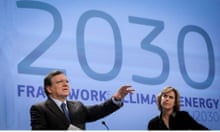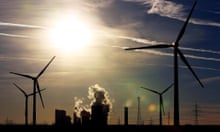A row is still simmering within the European commission over landmark targets for greenhouse gas emissions, hours before they are published on Wednesday.
The row, which jeopardises international negotiations on climate change, has been generated in part by the UK Liberal Democrats' U-turn on renewable energy.
At stake is whether the EU opts for a 35% or 40% reduction in greenhouse gas emissions by 2030, compared with 1990 levels, and whether the bloc sets a firm target for renewable energy generation by 2030.
The UK government is strongly opposed to a target for renewable energy generation, and its opposition has led to the impasse.
At least five commissioners are understood by the Guardian to be holding out against the 40% target, encouraged by the UK's stance. The Guardian understands that the European commission's president, Jose Manuel Barroso, is now poised to intervene in the row, and may ditch plans for a renewable energy target in order to seal a deal on the 40% emissions reduction.
The proposal for a new 2030 target of a 40% cut in emissions has been in the works for two years. . Several studies, including one undertaken for the EU, show that the EU could meet a 40% target without economic difficulty.
But some commissioners are understood to be still arguing in favour of an emissions cut of only 35% by 2030, which opponents say is inadequate. The bloc is already on track to exceed its current target of cutting emissions 20% on 1990 levels by 2020, and will likely reduce emissions to 25% by then.
However, as the biggest economies within the EU – including Germany, France and the UK – are all agreed that the 40% target should be accepted, the likelihood that the final proposal from the unelected commission will go against this is very small. The main row is now over the renewables element of the package, which Barroso is considering watering down or dropping to broker a compromise.
The renewable energy target is strongly supported by major member states including Germany, France and Italy.
The row has global resonance. Governments around the world have committed to publish pledges within their next year on their greenhouse gas emissions cuts beyond 2020, when current commitments expire, in preparation for a global conference on climate change to take place in Paris in 2015. At the Paris meeting, governments are expected to forge a new global agreement on climate change, binding both developed and developing countries to cut emissions in order to avoid dangerous levels of global warming.
The commission proposals have reached stalemate at this late stage in part because of the UK's insistence that there should be no renewable energy target for 2030.
The current EU 2020 targets include a goal of producing a fifth of energy from renewable sources by 2020, an aim that is credited with assisting the substantial growth in clean energy across the bloc. Many countries want a similar – but more stringent – goal to be included in the 2030 climate and energy package.
However, the UK is holding out against a 2030 renewables goal, preferring an emissions target alone. By contrast, major economies in the EU – Germany, France, Italy and five other member states – have taken a strong stand in favour of a renewables goal, writing to the European commission to say it was "crucial to provide certainty ... [to] ensure cost-effective investments in energy systems".
Their support for such a target comes despite the claims of Edward Davey, the UK's Liberal Democrat energy and climate change secretary, that his opposition to a 2030 renewables goal was "getting traction" among other member states. He only named one, Spain, whom he said was also behind the UK. The Spanish government did not reply to a request for comment.
The countries signing the letter in favour of a renewable energy target included Austria, Belgium, Denmark and Portugal as well as Germany, France and Italy. The Liberal Democrats have previously strongly supported a renewable energy target, and their current stance against such a target has been criticised by green campaigners.
The UK government's opposition to a renewables target, understood to be the result of a compromise within the governing coalition over climate policy – many right wing Tories are sceptical of climate change science, and the prime minister has been quoted as railing against "green crap" including renewable subsidies on energy bills – was first revealed by the Guardian in 2012.
It is understood that the Treasury wants to be able to include nuclear power and fears that a renewable energy target would mean less investment in its favoured alternative, shale gas.
Green MEPs and environmental campaigners are arguing in favour of much stronger target on greenhouse gas emissions, as well as a strong renewable energy goal.
Claude Turmes, vice chair of the Green Group of MEPs, said: "This cynical intervention by Barroso to drastically scale back EU climate and energy policy at the behest of UK prime minister Cameron smacks of political desperation. Failure to include a binding renewable energy target would completely undo the indisputable success of the existing 2020 target in driving forward renewable energy. It is a sop to those countries like the UK that want to pursue risky or dirty energy from nuclear, coal and shale gas, and will totally undermine investor certainty."
He added: "All of this would fly in the face of the commission's own impact assessment, which highlights the clear economic and employment benefits of pushing for ambitious binding targets for greenhouse gas reduction, renewable energy and energy savings."
Asad Rehman, international climate campaigner at Friends of the Earth, said: "Genuine commitment on climate would see binding carbon cuts of at least 70% by 2030, as well as mandatory targets on energy efficiency and renewable power. But despite all the rhetoric about the need to slash emissions, the commission is still dancing to the tune of big polluters and energy-guzzling firms."
A study by several academic research instutions, under the banner of the Stanford Energy Modelling Forum, found that increasing the current target of a 20% emissions cut by 2020, compared with 1990 levels, to a 40% target by 2030 would cost less than 0.7% of economic activity. Leading companies under the umbrella of the Prince of Wales EU Corporate Leaders Group have also endorsed the 40% target.




Comments (…)
Sign in or create your Guardian account to join the discussion